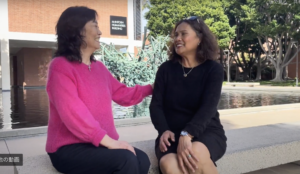Dr. Richard Mayer at University of California, Santa Barbara
Our first guest of “Open Learning” is world-renowned educational psychologist Dr. Richard Meyer of the University of California, Santa Barbara. He has made a significant contribution to multimedia learning theory, the theory that “People learn better from words and pictures than words alone. He is the author of Multimedia Learning. https://www.amazon.co.jp/Multimedia-Learning-Richard- mayer/dp/1316638081
I would like to introduce you two parts from his book. He wrote “From my office on the third floor of Psychology East on the campus of the University of California, Santa Barbara, I can see the Pacific Ocean, glimmering in the morning sun. If I walk down the street to the beach, I can watch the waves roll onto the sandy beach. Each wave builds to a crest, and comes ponding to shore, dominating the area for a brief moment, until the water gathers itself together and drifts back out to be part of the next big wave. As I watch, I think to myself, educational fads can be like ocean waves. They build up, reach a crest, and inundate our schools for a while; then, they recede and regroup for the next big wave. My hope is we can break this cycle of educational fads, and build educational practices on a foundation of research evidence. …If this book helps you to see the value of applying the science of learning to multimedia instruction, I will consider it a success.” Reading this paragraph, I could envision beautiful beach at UCSB. Currently, we have a big wave called generative AI. In this age particular, we should get the cornerstone that we can apply and evaluate our instruction.
Another part, we would like to highlight is that he wrote ” Writing this book has been my labor of love.” He should have spent a large amount of time and effort to complete this book. I would say that someone who can articulate he deeply committed himself to the work he loves is one form of true happiness.
When did such a great scholar feel that he had overcome his limits? We hope you enjoy this friendly interview with YouTube. Especially it is recommended for graduate students and professional researchers.

